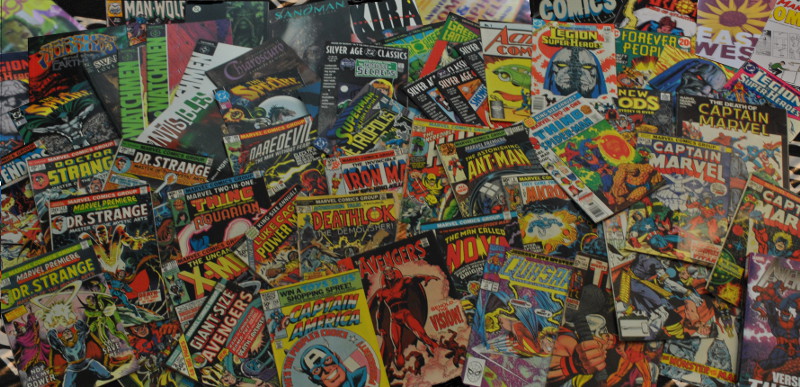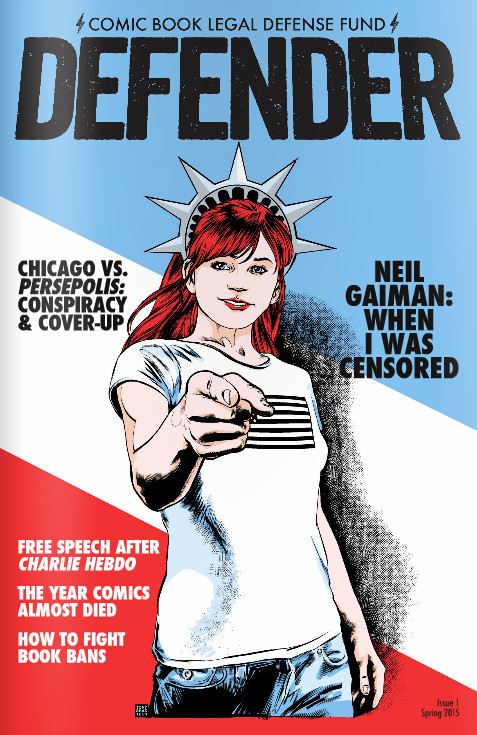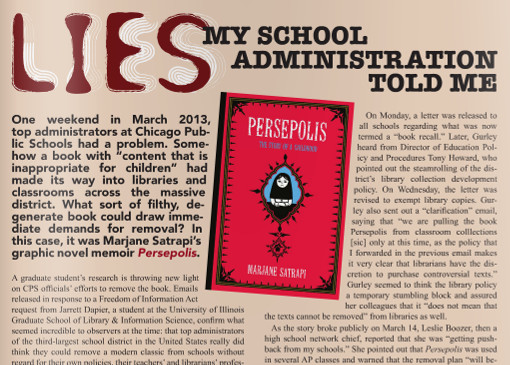Some months back I wrote of my growing ambivalence towards the Comic Book Legal Defense Fund. On one hand there is no question that their dedication to the comics community, in general, and to creators, specifically, is needed. One need only look at the incidents surrounding the Charlie Hebdo incident to understand the value of protecting free speech. On the other hand, there is a growing concern in my mind about the methods that CBLDF uses to makes it point.
A case in point arose this past May when I journeyed out on Free Comic Book Day to generally shop local businesses, stimulate the hometown economy, and indulge my comic book appetite by acquiring some back issues missing from my collection and to sample some of the new stuff out there.
This year, the CBLDF offered for as a free comic the first issue of their ongoing publication Defender.
The issue covered free speech concerns and talked about some important and, at times, troubling developments concerning the freedom to express oneself. These included the joint brief filed by CBLDF and the Cato institute urging SCOTUS to protect First Amendment liberties; a blurb about a cartoonist by the name of Zunar who was arrested in Malaysia for ‘offensive speech’ on Twitter; and a discussion of the aftermath of Charlie Hebdo attacks.
What troubled me was there coverage of the dust up in the Chicago Public School (CPS) district over the exclusion of the graphic novel Peresopolis.
It began with the front cover of Defender boasting a provocative splash “Chicago vs. Persepolis: Conspiracy and Cover-up”. The inside of the issue sports a one page story entitled “Lies My School Administration Told Me”.
The main paragraph reads like the typical movie trailer melodrama ‘In a world they didn’t make…’ with an all too common use of the logical fallacy of the strawman in to boot. The article implies that someone in the CPS had judged that a book had ‘content that is inappropriate for children’ and then goes on to ask “What sort of filthy, degenerate book could draw demands for removal?” CBLDF doesn’t produce a single email from the CPS that claims the book is ‘filthy’ and ‘degenerate’. These terms are simply examples of emotional hyperbole added by the writer to provide an extra dash of saucy flavor.
The article then goes on to say
My question to the CBLDF is simply why shouldn’t CPS officials have the authority to take Persepolis off the shelf? There are at least two good reasons why CPS officials should and do exercise their discretion when it comes to any book.
The first reason is that these officials have a responsibility to educate the students of the Chicago Public Schools according to how the citizens of Chicago want their children educated. In that capacity they make decisions daily about what curriculum to teach to the children in their care and to pick and choose which ideas they expose and which they keep quiet. Ask yourself if any reasonable person should harass the CPS to promote hardcore pornography as suitable material? How about propaganda from the Ku Klux Klan or the Neo Nazis? What about a display of the Confederate flag? If your answer to any of these questions (or any other material you judge to be inappropriate or controversial) is no then you support the notion that some material should be excluded. At this point, the argument is not one of principle but of degree – just where should the line be drawn. That is a healthy argument to have but it is not one that should be swayed by emotional language like ‘conspiracy’, ‘cover-up’, or ‘lies’. And these terms were used as emotional triggers on the cover and in the headline of the piece as nothing in the narrative of what CPS officials did indicated that any of these terms applied. It may be true that they do apply, but there is no evidence provided to support that claim. Fundamentally, it is up to school officials to decide what is and is not appropriate based on their entire demographic and in conjunction with school boards, parents, and the like. Every community has the right and the obligation to set its own standards of decency.
The second reason is not rooted in questions of a moral aesthetic but in economics. School systems, like any other human agency, are limited by scarcity. Simply put, there is only a finite amount of money to be used to purchase materials. The district is under a fiduciary responsibility to make the most of its money. That means that they always ‘censor based on finite resources’ – that is to say that they don’t and can’t purchase every book out there. Often, they don’t even consider material because it is inappropriate for their students. I’m not speaking of material which may be morally questionable but rather material that is simply not appropriate by reason of age. I doubt that one would find books on advance quantum field theory or Neo-Platonist philosophy on the CPS shelves. I actually find the omissions of these types of works much more severe than omissions driven by morals or taste as the former limit the intellectual achievement and the world view of students. Controversial material can always be found on the internet because its very controversy draws attention. But important material associated with deep intellectual achievements is rarely discussed in the media. So how is a student going to be exposed to the finest offerings of human thought if no record of it can even be found on a library shelf? But I recognize that in a world of finite resources hard choices have to be made.
The final point worth noting is that CPS is not engaged in censorship in any real fashion. They are not stopping students from owning it; stopping the publisher from selling it; stopping the author from writing or profiting from it, or locking any of these up in jail. If CPS had the power to indulge in any or all these actions then their conduct would certainly rise to actual examples of censorship. They would then constitute a government that infringes on the rights of its citizens by force. What CPS did may offend our sensibilities or make us question their judgement, but it doesn’t rise to level of government led book burning. Equating real censorship with the actions of a community deciding its own standard of decency is akin to the use of the word ‘Nazi’ when talking about someone who you don’t like – it conflates real evil with annoyance.
Real evil was portrayed in Persepolis with the author’s narrative.
Whether that is worth discussing in the Chicago Public Schools is a matter for the citizens of Chicago to decide and to choose – a right that was denied the people of Iran in the fashion described in Persepolis. I certainly support CBLDF’s right to advise, persuade, and even coax the district to reconsider its actions. I also understand their concern that the CPS are invested with a lot of power and authority and that power must be held in check. But the rhetoric rises to the level where CBLDF is using propaganda to bully, then I say that they are engaging in exactly the same heavy handed techniques they deplore.



